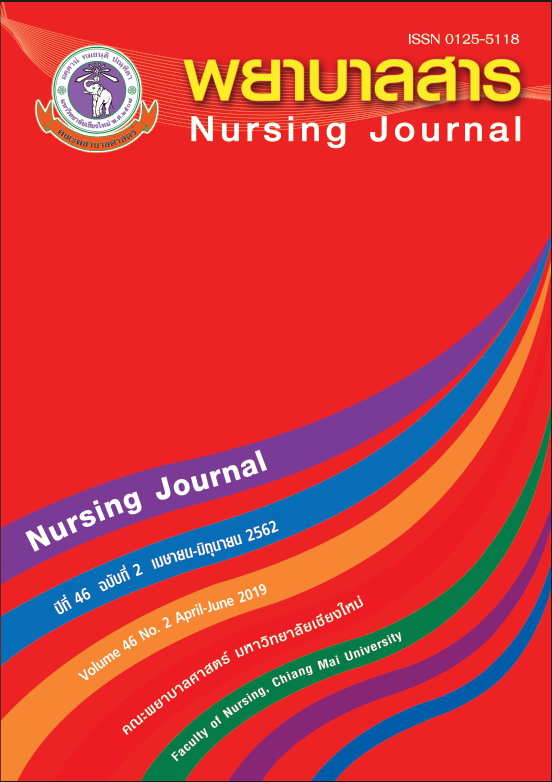Effects of an Empowerment Program on Sense of Mastery and Severity of Osteoarthritis in Persons with Knee Osteoarthritis
Keywords:
การเสริมสร้างพลังอำนาจ, ความรู้สึกถึงความสามารถในการควบคุม, ความรุนแรงของข้อเสื่อม, ผู้ที่เป็นโรคข้อเข่าเสื่อมAbstract
Empowerment is an accepted process in terms of effective enhancing self-care among patients with chronic disease. This quasi-experimental study aimed to examine the effects of an empowerment program on a sense of mastery and severity of osteoarthritis among persons with knee osteoarthritis. The research participants were composed of 36 persons with knee osteoarthritis who attended the outpatient department of a university hospital during January to May 2018. The research tools were composed of the demographic data form, the sense of mastery assessment form and the knee osteoarthritis severity assessment form. Data were analyzed using descriptive statistics, Mann Whitney U-test, and Wilcoxon matched-pairs signed-rank test.
The results of this study revealed that:
- Persons with knee osteoarthritis who participated in the empowerment program reported a sense of mastery significantly higher than before participating in the program (P < .01).
- Persons with knee osteoarthritis who participated in the empowerment program reported a sense of mastery significantly higher than those who did not participate in the program (P < .01).
- Persons with knee osteoarthritis who participated in empowerment program reported significantly less severity of knee osteoarthritis than before participating in the program (P < .01).
- Persons with knee osteoarthritis who participated in empowerment program reported significantly less severity of knee osteoarthritis than those who did not participate in the program (P < .01).
This program can be used effectively with a nursing service system using primary nursing care or a case management model.
References
Burns, N., & Grove, S. K. (2005). The practice of nursing research: Appraisal, synthesis, and generation of evidence. St. Louis, MO: Saunders Elsevier.
Centers for Disease Control and Prevention. (2015). Osteoarthritis. Retrieved from http://www.cdc.gov/arthritis/basics/osteoarthritis.htm#10.
Chen, A., Gupte, C., Akhtar, K., Smith, P., & Cobb, J. (2012). The global economic cost of osteoarthritis: how the UK compares. Arthritis, 1(1), 2012. doi:10.1155/2012/698709
Gibson, C. H. (1993). A study of empowerment in mothers of chronically ill children (Master’s thesis). Available from Boston College Dissertations and Theses, AAI9402789.
Gibson, C. H. (1995). The process of empowerment in mothers of chronically ill children. Journal of Advanced Nursing, 21(6), 1201-1210.
Information and Health Information. (2015). Public Health Statistic A.D. Retrieved from http://bps.moph.go.th/new_bps/ Public Health Statistic. (In Thai).
Jack, F. I., Miller, L. E., & Block, J. E. (2013). Quality of life in patients with knee osteoarthritis: A commentary on nonsurgical and surgical treatments. The Open Orthopaedics Journal, 7(1), 619. doi:10.2174/1874325001307010619
Kinney, C. K., Rodgers, D. M., Nash, K. A., & Bray, C. O. (2003). Holistic healing for women with breast cancer through a mind, body, and spirit self-empowerment program. Journal of Holistic Nursing, 21(3), 260-279.
Methian Chantha. (2004). Effect of empowernment program on health behaviors among persons with chronic obstructive pulmonary disease (Master Thesis Nursing Science for the Elderly). Graduate, Chiang Mai University. (In Thai).
Pattarin Kittiboonyakun and Watcharin Paktipat. (2015). Prescribing Patterns and Medication Problems Related to the Use of Pain Medication and Adjuvant Drugs in Patients with Osteoarthritis. Thai Journal of Pharmacy Practice, 7(2), 278-287. (In Thai).
Silverwood, V., Blagojevic-Bucknall, M., Jinks, C., Jordan, J. L., Protheroe, J., & Jordan, K. P. (2015). Current evidence on risk factors for knee osteoarthritis in older adults: A systematic review and meta-analysis. Osteoarthritis and Cartilage, 23(4), 507-515. doi:10.1016/j.joca.2014.11.019
Sakoarat Suppasan, Chommanard Wannapornsiri, Chanjar Suntayakorn, and Taweesak Siripornpibul. (2007). Experiences on Self-care among Patients with Osteoarthritis of the Knees. Journal of Nursing Science Naresuan University, 1(1), 72-86. (In Thai).
Sompong Pamulila. (2007). Effect of Empowerment on Self-Concept Adaptation in Liver Cancer Patients (Master Thesis Department of Nursing Science). Graduate, Khon Kaen University. (In Thai).
Swift, A. (2011). Osteoarthritis 1: Physiology, risk fractors and causes of pain. Nursing Times, 108(7), 12-15.
Warakorn Jingjit. (2016). When is osteoarthritis?. Retrieved from http://www.cmed.cmu.ac.th/ th/knowledge-26. (In Thai).
Wong, A. L., Harker, J. O., Lau, V. P., Shatzel, S., & Port, L. H. (2004). Spanish Arthritis Empowerment Program: A dissemination and effectiveness study. Arthritis Care & Research, 51(3), 332-336. doi:10.1002/art.20395
Yaowapa Pornweang, Wiphaphan Meunma, Pisamai Srisuwannophaku, and Wantana kaewyoungphang. (2013). The Effect of Group Empowerment on Foot Care Behaviors and Quality of Life in Type 2 Diabetes Patients with Foot Ulcer. Nursing Journal of the Ministry of Public Health, 20(2), 85-97. (In Thai).
Downloads
Published
How to Cite
Issue
Section
License
บทความที่ได้รับการตีพิมพ์เป็นลิขสิทธิ์ของวารสารพยาบาลสาร
ข้อความที่ปรากฏในบทความแต่ละเรื่องในวารสารวิชาการเล่มนี้เป็นความคิดเห็นส่วนตัวของผู้เขียนแต่ละท่านไม่เกี่ยวข้องกับมหาวิทยาลัยเชียงใหม่ และคณาจารย์ท่านอื่นๆในมหาวิทยาลัยฯ แต่อย่างใด ความรับผิดชอบองค์ประกอบทั้งหมดของบทความแต่ละเรื่องเป็นของผู้เขียนแต่ละท่าน หากมีความผิดพลาดใด ๆ ผู้เขียนแต่ละท่านจะรับผิดชอบบทความของตนเองแต่ผู้เดียว






